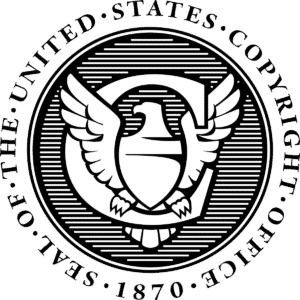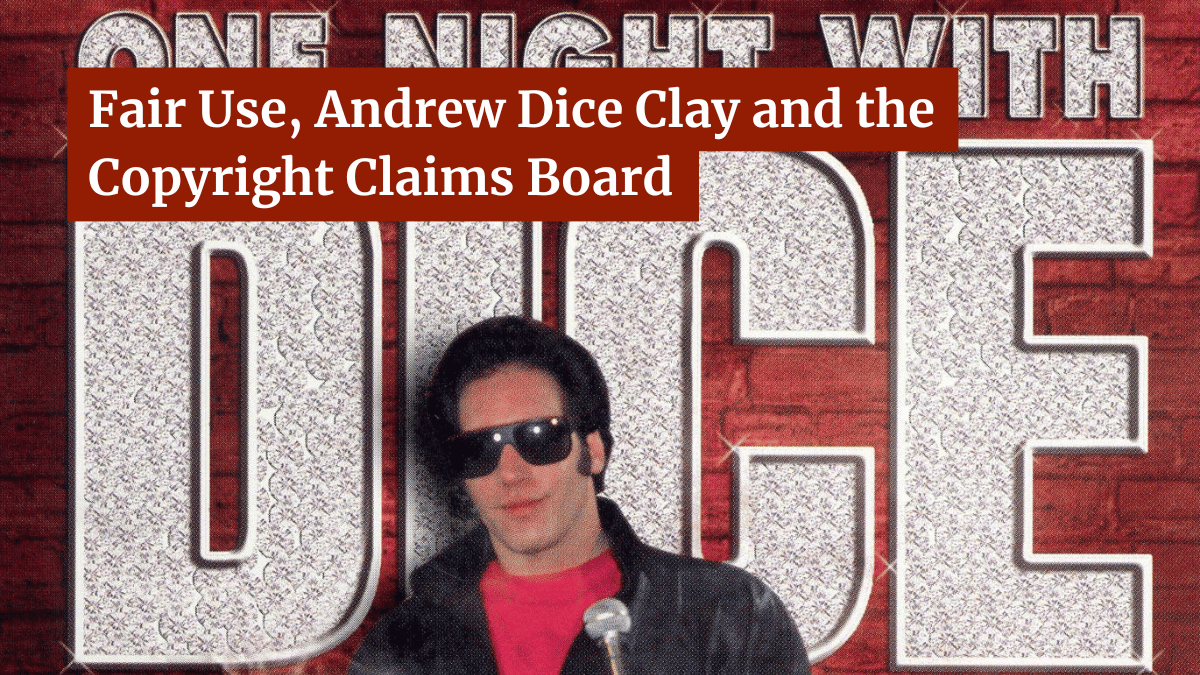Fair Use, Andrew Dice Clay and the CCB

It has been just over a year and a half since the Copyright Claims Board (CCB) first opened its doors.
Since then, the United States’ new copyright “small claims court” has heard a variety of cases including a professor targeting an essay mill, Paramount filing a claim against a popup restaurant, a case involving flight cockpit recordings and more.
But while many of the cases have been interesting from a narrative standpoint, and many interesting from a damages standpoint, few have dealt with truly nuanced areas of copyright. That’s particularly true for contested cases.
However, barring a settlement, the case Comedy Spotlight Productions, Inc. v. Store on Sunset LLC et al (23-CCB-0035), may give the CCB an opportunity to weigh in on an area of both great nuance and rapid change: Fair Use.
The case, which looks at the use of a video clip in a documentary, is not only being actively contested, but contested by two parties who are using attorneys. As such, it’s a case that is as close as possible to a regular federal court trial, while asking some serious questions regarding fair use for the board to answer.
That makes this a case to watch at the CCB and one worth examining in more detail here.
Background of the Case
In 1986, comedian Andrew Dice Clay recorded his stand-up comedy special One Night with Dice, which would be released the next year and go on to achieve significant commercial success.
In 2020, the company Store on Sunset produced a five-part documentary mini-series entitled The Comedy Store, which included interviews with dozens of comedians focusing on the history of the Los Angeles comedy club of the same name.
In episode three of the series, the conversation turned to Andrew Dice Clay and his tendency to tell offensive jokes that may have harmed his career. In addition to Bob Saget saying, “All I remember is that it was a fast drop off”, the segment included a 17-second clip of Clay telling a homophobic joke, which was taken from the special.
Comedy Spotlight Productions, the claimed owners of the special, filed a claim with the CCB in January 2023, seeking $15,000 in damages, the most allowed through the CCB, and judgment that the clip does not amount to fair use.
Though two of the respondents were dismissed from the case due to an issue over providing service, Store on Sunset has responded to the claim and, last month, filed their written response and followed it up yesterday with their evidence in the case.
Store on Sunest, for their part, does not deny the use of the clip nor that it wasn’t licensed. Instead, they argue that the use is a fair use and that the board should rule in their favor.
This sets the stage for a clash over a question of fair use before the CCB, one that is being actively litigated aggressively by both sides and will be an interesting test of the CCB’s handling of such complicated matters.
The Arguments
The two sides don’t seem to disagree much on what happened, instead, the dispute is over how they are framing it.
The claimant, Comedy Spotlight Productions, is presenting this as a case of the documentary using a whole joke. They note that the documentary uses the entire joke, from beginning to punchline, in its entirety.
They further claim that the use of the joke wasn’t necessary as they had already made their point with an earlier two-second clip that was not part of the case.
Store on Sunset, the respondent, frames things differently. They frame it as using a 17-second clip from an approximately 46-minute comedy special as part of a 58-minute episode that itself was part of a five-episode miniseries.
They also highlight that, in their view, the use was highly transformative. They argue that the original intent of the special was to be comedic, while their documentary was meant to be serious and highlight the negative impacts this (and other) jokes had on his career.
The claimant doesn’t directly weigh in on transformative use in any of their filings to date.
Store on Sunset further claims that the use of the clip did not harm the market for the original work and that, even if damages are owed, the $15,000 sought is “grossly inflated”, noting that the licensing for the entire special has only generated $1,869 and there is no evidence of royalties generated for clips of the work.
As such, they are seeking to have the case dismissed or, at the very least, damages minimized.
Why It Matters
Right now, fair use is in a period of fluctuation. It’s been less than a year since the Supreme Court handed down its decision in the Warhol case, shifting the balance away from a focus on transformative use and to one that more closely weighs all the factors.
We saw the first major impact of the Warhol decision just this week, with the Fourth Circuit citing the case heavily in overturning a lower court’s summary judgment. It’s a virtual guarantee that more changes and shifts are to come.
It’s in that atmosphere that the CCB, barring a last-minute settlement, will be hearing this case. They will have to interpret the Warhol ruling, examine how it alters previous major fair use decisions, and then decide how it impacts this case.
In short, the CCB is being thrust into one of the thorniest areas of copyright at a time where there is great upheaval in it. That makes it crucial to see how the CCB handles this case as it will likely indicate how the board will rule moving forward.
All that said, I find the arguments made by the respondent to be the most compelling. Though I am loathe to predict how any court (or board) will rule, the arguments made by Store on Sunset are very compelling.
Though Comedy Spotlight Productions tries to present the work as a single joke, that’s not how the work was registered nor is it how it has been presented or licensed. It’s a comedy special and the documentary only used 17 seconds from it.
However, even if we argue that the joke is one work, the entire joke spoke to the point that the documentary was trying to make. The punchline, which included a homophobic slur, helped drive the point home.
But, even if the CCB does rule that the documentary infringed, it seems unlikely that they’ll award significant damages. As we’ve seen in previous cases, where the claimant can’t show actual damages, the CCB tends to set the statutory damages to the minimum, which is $750 per work.
With no evidence of successfully licensing clips or harm to the sale of the original work, that’s likely where the CCB will be looking if they rule in favor of the claimant.
Still, it’s going to be an important case to watch and the logic that the CCB uses to reach its conclusion will be very important as it will likely indicate how the board will address future cases.
That makes this an important case to follow, regardless of how one feels about the case itself.
Bottom Line
All this being said, one of the things that the CCB has done incredibly well is take the issues of copyright extremely seriously, despite the cases being over much smaller amounts.
Its decisions, though few, have shown both great knowledge and great reverence for the law. I have no reason to think that it will approach this case with anything less than we would expect from a regular court.
Though the CCB’s decisions are not precedent, either for other courts or the CCB itself, this could be one of the first times to date the board weighs directly in on a fair use dispute, making it a case to watch.
Even if it isn’t precedent, it can give us an idea how the CCB may examine future cases and what the likely outcomes of those cases will be.
In short, it’ll be a glimpse into the mindset of the CCB on fair use matters, something that, to date, we have been lacking.
Want to Reuse or Republish this Content?
If you want to feature this article in your site, classroom or elsewhere, just let us know! We usually grant permission within 24 hours.
